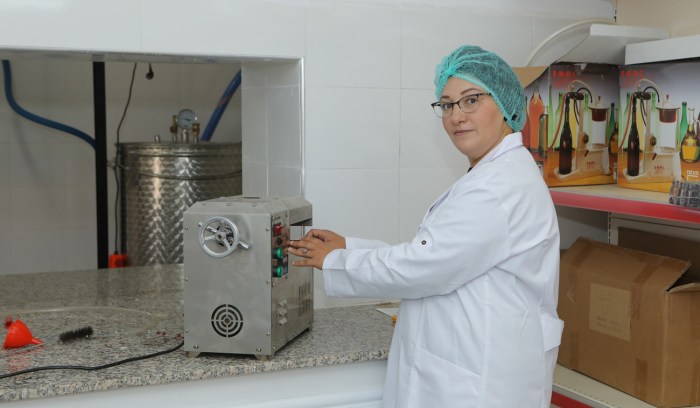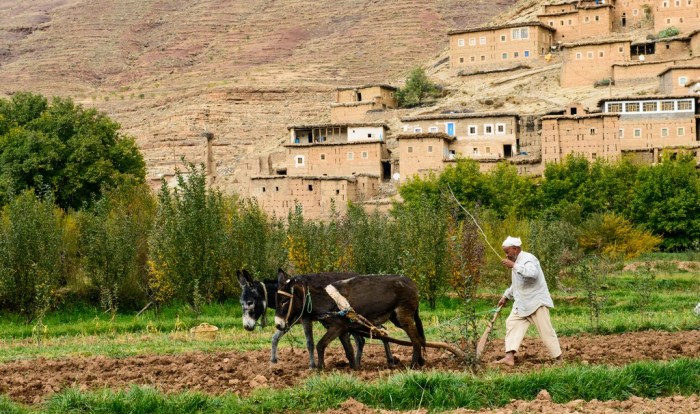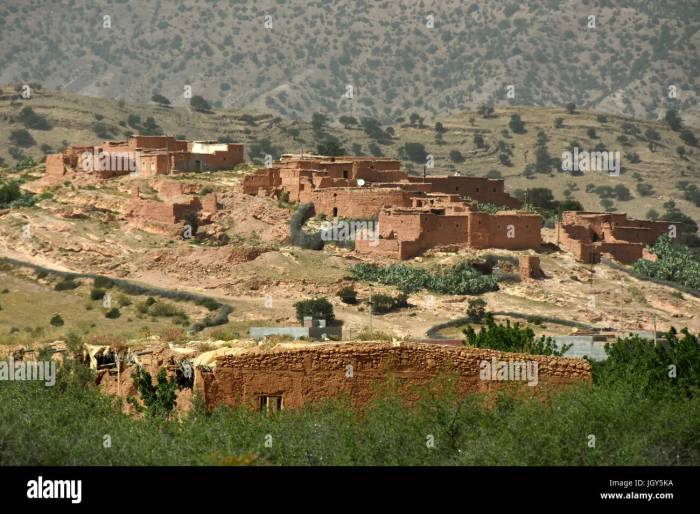Fatima lives in rural morocco – Fatima’s Rural Moroccan Life: Exploring the Challenges and Aspirations is a narrative that takes readers on a journey into the heart of rural Morocco, where we meet Fatima, a young woman whose life is shaped by the unique circumstances of her environment.
The story delves into the challenges and aspirations of Fatima, providing a glimpse into the complexities of life in a rural setting.
Fatima’s village, nestled amidst the rolling hills and vibrant landscapes of Morocco, presents a stark contrast to the bustling cities. The community’s strong cultural traditions and close-knit social bonds influence every aspect of Fatima’s daily existence.
Fatima’s Rural Environment

Fatima resides in a small village nestled amidst the rolling hills and verdant valleys of rural Morocco. The village is characterized by traditional earthen houses, narrow winding streets, and a close-knit community.
The rural setting significantly influences Fatima’s daily life and opportunities. The lack of modern amenities, such as running water and electricity, poses challenges for her family’s daily routines. Access to healthcare and education is limited, and transportation to larger towns is often difficult and time-consuming.
Agriculture and Livelihoods
Agriculture forms the backbone of the village economy, with most families relying on farming and livestock raising for sustenance. Fatima’s family cultivates crops such as wheat, barley, and olives, while also tending to sheep and goats. The agricultural work is physically demanding and requires long hours in the fields.
Education and Opportunity
Educational opportunities in the village are limited, with only a primary school available. Beyond primary education, Fatima and her peers must travel to a neighboring town for secondary schooling, which can be a significant financial burden for families. As a result, many girls in the village do not have the opportunity to pursue higher education.
Community and Social Life
The village community is close-knit and supportive, with strong bonds formed through shared experiences and traditions. Fatima participates in village events, such as weddings and religious festivals, and enjoys spending time with her friends and family. However, the lack of privacy and the limited opportunities for recreation and leisure activities can sometimes feel constraining.
Fatima’s Family and Community: Fatima Lives In Rural Morocco

Fatima’s family plays a significant role in her life. Her parents are farmers who work hard to provide for their family. Her father is a respected member of the community, known for his wisdom and kindness. Her mother is a skilled weaver who creates beautiful rugs and textiles.
Fatima lives in rural Morocco, where access to education is limited. Thoat vi dia dem tieng anh is an online platform that provides free English lessons to those in need. This platform has been a lifeline for Fatima, as it has allowed her to continue her education and improve her English language skills.
Fatima has two younger brothers and a younger sister. Her brothers help their father with the farming, while her sister helps their mother with the weaving. The family is very close-knit, and they support each other through good times and bad.
Social and Cultural Norms
Fatima’s community is a traditional one, with strong social and cultural norms. The community is based on a patriarchal system, with men holding most of the power and authority. Women are expected to be subservient to men and to take care of the home and children.
There is a strong emphasis on family and community in Fatima’s culture. Extended families often live together, and there is a strong sense of obligation to help and support one another.
Role of Tradition and Customs, Fatima lives in rural morocco
Tradition and customs play an important role in Fatima’s life. She is expected to follow the traditional roles and behaviors that are expected of women in her community. This includes being modest in her dress and behavior, and deferring to men in decision-making.
However, Fatima is also a strong-willed and independent woman. She is not afraid to challenge traditional norms when she believes it is right. For example, she has chosen to pursue an education, even though it is not common for women in her community to do so.
Fatima’s Education and Aspirations
Fatima’s access to education is limited due to her family’s financial constraints and the remote location of her village. The nearest school is several kilometers away, making it difficult for her to attend regularly. Additionally, cultural norms and gender roles often prioritize education for boys over girls.
Despite these challenges, Fatima is determined to pursue her education. She dreams of becoming a teacher and inspiring other girls in her community. She believes that education is the key to a better future for herself and her family.
Aspirations and Cultural Factors
- Fatima aspires to become a teacher to empower other girls in her community.
- Education is perceived as crucial for Fatima’s personal and family’s progress.
- Cultural norms and societal expectations may influence Fatima’s educational path, with a focus on traditional roles for girls.
- Fatima’s determination and resilience drive her to overcome challenges and pursue her educational goals.
Fatima’s Daily Routine

Fatima’s daily routine is shaped by her rural environment and the responsibilities she has within her family and community. Her days are filled with a variety of tasks, from helping with household chores to attending school and participating in community activities.
Fatima’s day typically begins before sunrise. She helps her mother prepare breakfast for the family and then cleans the house. After breakfast, she walks to school, which is about a mile away. Fatima is a good student and enjoys learning.
She especially likes math and science.
Responsibilities Within Family and Community
After school, Fatima helps her mother with the evening meal. She also helps her younger siblings with their homework. In the evenings, Fatima often participates in community activities, such as attending meetings or helping to organize events. Fatima is an active member of her community and is always willing to lend a helping hand.
Daily Routine
- Before sunrise: Helps with household chores (e.g., preparing breakfast, cleaning the house)
- Morning: Walks to school (about a mile away)
- Afternoon: Attends school
- After school: Helps with the evening meal and assists younger siblings with homework
- Evenings: Participates in community activities (e.g., attending meetings, helping to organize events)
Fatima’s Perspective on Life

Fatima’s life in rural Morocco has been shaped by a mix of tradition, hard work, and resilience. Despite the challenges she faces, she maintains a positive outlook and has aspirations for a better future.
Fatima’s Hopes and Dreams
Fatima dreams of a life beyond her village. She hopes to receive a higher education and pursue a career that will allow her to make a difference in her community. She is particularly passionate about improving healthcare and education for women and children.
Fatima’s Fears and Challenges
Fatima is aware of the obstacles she faces as a young woman in rural Morocco. She fears that traditional gender roles and limited opportunities may prevent her from achieving her goals. Additionally, the lack of access to quality education and healthcare in her village is a concern.
Fatima’s Worldview
Fatima’s experiences have taught her the importance of perseverance and community. She believes that education is the key to unlocking a better future, and she is determined to overcome any challenges that stand in her way. Her positive attitude and strong sense of purpose serve as an inspiration to those around her.
Essential Questionnaire
What are the main challenges Fatima faces in her daily life?
Fatima’s daily life is shaped by the challenges of living in a rural environment, including limited access to education, healthcare, and economic opportunities.
How does Fatima’s community influence her life?
Fatima’s community plays a significant role in her life, providing support and guidance while also reinforcing traditional norms and expectations.
What are Fatima’s dreams and aspirations for the future?
Fatima dreams of pursuing an education and expanding her horizons beyond her village. She hopes to make a difference in her community and contribute to its development.